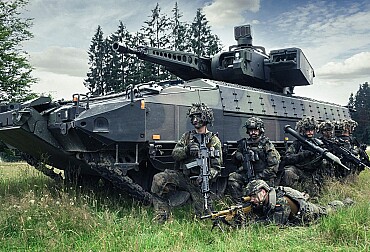Russia’s use of Starlink in Ukraine: An ongoing challenge for the Pentagon and SpaceX
The Pentagon and SpaceX are locked in a challenging battle to prevent Russia from utilizing Starlink satellite terminals in Ukraine, posing a significant and continuous problem. The efforts to curb this unauthorized use have led to an ongoing game of whac-a-mole, as Russian forces persistently acquire new terminals through the black market, despite attempts to shut them off.
John Hill, the deputy assistant secretary of defense for space and missile defense, highlighted the persistent nature of this issue during a Senate Armed Services subcommittee hearing on strategic forces. Hill acknowledged that while the identification and deactivation of these terminals are ongoing, Russia remains undeterred in its efforts to obtain more. "I think this will be a continuous problem. We can continue to identify them and turn them off, but I think Russia will not stop" at trying to get more terminals," he stated.
The commercial nature of Starlink complicates the situation. Since it is readily available on the market, Russian forces can continue purchasing these terminals as the Pentagon and SpaceX work to deactivate them. The challenge is further exacerbated by the impracticality of geofencing specific areas to block Russian use, as this could also disrupt Ukrainian operations in those regions.

In response to these concerns, Senator Elizabeth Warren (D-Mass.) questioned Hill about SpaceX's cooperation with the Pentagon to mitigate Russia’s use of Starlink. Hill reassured that SpaceX has been highly cooperative, not only with the U.S. government but also with the Ukrainian government. "Not only has SpaceX been very cooperative with the entire U.S. government and the government of Ukraine, they’ve been forward leaning in identifying and bringing information to us," he emphasized.
The Pentagon’s collaboration with SpaceX is facilitated through its commercial integration cell at U.S. Space Command. This initiative allows commercial companies and the government to share proprietary and classified information, fostering a more effective partnership. Hill noted that strategies have been developed with SpaceX to discern which terminals should remain active and which should be deactivated.
While SpaceX also markets a military version of Starlink, called Starshield, to the U.S. military, this option is currently not available to Ukraine. This limitation further underscores the complexity of the situation, as the more secure Starshield could potentially offer a solution to prevent unauthorized use.
Senators Warren and Mark Kelly (D-Ariz.) have previously voiced their concerns over Russia’s exploitation of Starlink technology. Warren has been particularly vocal, urging the Pentagon to hold military contractors accountable for any misuse of their technology by adversaries. This ongoing scrutiny highlights the critical nature of ensuring that commercial technologies do not fall into the wrong hands, particularly in conflict zones.
In conclusion, the Pentagon and SpaceX are engaged in a continuous and challenging effort to prevent Russia's use of Starlink in Ukraine. Despite significant cooperation and strategic efforts, the persistence of Russian forces in acquiring new terminals through the black market remains a formidable obstacle. The situation underscores the broader challenges of managing commercial technology in military contexts and the necessity for robust cooperation between government and private sector entities to address such issues effectively.








